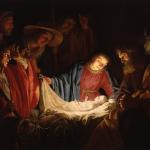January always makes me think of stars. It begins with an artificial star – the ball dropping in Times Square. Six days later, Christians celebrate Epiphany – a story about a star. Around this time of year the temperature drops noticeably. On these colder nights, the stars begin to shine brighter and stronger. The scientific reason for this is that there is less moisture in the air to distort the starlight. Coming on the heels of Christmas, however, it’s hard not to feel that the starlight is brighter because of the light that has come into the world. The people in darkness have seen a great light.
January always makes me think of stars, but this year the thought of stars seems like a memory. Where I live we’ve had so much rain and cloud cover that a ray of sunshine in the afternoon is a novelty. At night, I take the dog out to do her business, look up at the sky and see nothing but haze. The starlight is hidden, and hidden with it is the sense that the world has been newly brightened by the celebration of Christmas.
I miss my post-holiday contemplation of the stars. It’s disappointing to look up and see mist and light pollution. It’s also disappointing that nature is imitating my own state of mind when it comes to faith and religion and the Church. It’s inconsiderate of the sky to be filled with clouds when what I most want is clarity.
It’s a joke I make to myself, but it gives me pause. Is clarity what I most want? If I had perfect clarity, but gazed into an empty sky, I would still be disappointed. What I most want is the presence of the stars. I want to see starlight. The way I talk about bad weather obscuring the sky hides what I actually want.
The same is true for faith. I think about Catholicism, the abuse scandals, the ways in which Catholics have failed to love, and I want clarity. I want to understand how these failures can possibly consistent with what the Church is supposed to be. This desire for clarity ends up being a metaphorical cloud cover that obscures my desire for God.
So much of the time, I try to pray, I try to think about God – and end up wrestling with this unwieldy framework that is the Church, or my idea of the Church, or my desire for clarity, or unhealthy patterns of belief, or… something.
I want to put this framework down and get to God himself, but here’s the thing: I also want to look at the stars, or even a cloudy sky, and not continually interpret it through metaphor. I want to look at the stars and just see starlight. I want to look at the clouds and just see clouds, and not see A Metaphor for Drifting Faith.
An epiphany is a revelation of something new. The Epiphany was a meeting of persons with God. There was no framework in place for understanding it. If the star in the story of the wise men is just a metaphor, then the story loses something.
I’m used to thinking that it’s a gift to see everything in the light of faith. I’m used to lugging around this enormous invisible framework that I use for understanding things that happen, things that I see. And yet, when I pop a star into a box and label it “metaphor for faith,” something is lost. If everything is always sorted according to an established framework, then there can never be an Epiphany, or epiphanies. If everything has its proper box and label, then there can never be stars or clouds or life to be enjoyed. There’s only symbol.
It’s typical that I can’t explain why I need to extricate myself from metaphors without appealing to metaphor, and yet it’s also okay. Paradox and epiphanies are challenges to frameworks too.
The sun came out this afternoon (which is not a metaphor, it really happened), and maybe there will be stars tonight. I’d like to see stars on Epiphany.












